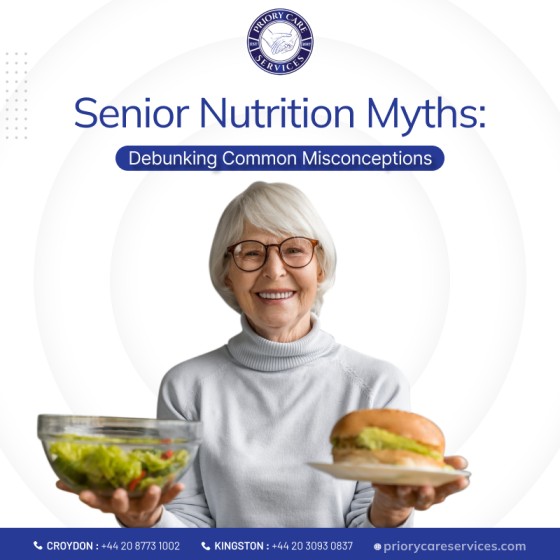The importance of eating a nutritious, well-balanced diet for overall health increases with age. However, there are a lot of false beliefs and misconceptions about senior nutrition that might spread false information and endanger the well-being of senior citizens. Here in this blog, experts offering the best home care services in Kingston Upon Thames dispel a few widespread misconceptions in this blog and provide factual information so elders may make educated food decisions.
Myth 1: Seniors Ought to Consume Limited Protein
Myth number one is that older people don’t require as much protein in their diets. In actuality, protein continues to be an essential part of a senior’s diet. Protein is necessary for immune system support, muscular mass maintenance, and general strength enhancement. Good protein sources for seniors to eat include lean meats, poultry, fish, legumes, and dairy products.
Myth 2: Elderly People Don’t Need to Drink as Much Water
The misconception that elderly people don’t need to drink as much water makes dehydration a serious problem for them. Digestion and temperature control are only two of the many body processes that depend on adequate hydration. Seniors who receive home care services in Kingston Upon Thames, where the weather may fluctuate, should specifically make a conscious effort to stay hydrated throughout the day.
Myth 3: Seniors Must Steer Clear of Carbs
Myths about carbohydrates often give the impression that older people should consume fewer of them. Carbs, however, are essential for brain function and are the body’s main source of energy. Seniors should minimize processed foods and refined sugars and increase their intake of complex carbs, which are found in whole grains, fruits, and vegetables.
Myth 4: Older People Can Forego Meals
For many reasons, such as diminished appetite, seniors may develop a habit of missing meals. On the other hand, skipping meals might result in energy imbalances and dietary shortages. Seniors who require home care services in Croydon and Kingston Upon Thames can be greatly helped by providing them with wholesome meals and snacks on a regular basis.
Myth 5: Supplements Are Not Suitable for Seniors
Even though it’s best to get nutrients from whole foods, some elderly people could find it difficult to get all the nutrients they need from their diet. Supplements may be helpful in certain situations, especially for vitamins like B12, D, and calcium. Depending on a person’s health, speaking with a healthcare provider can assist in determining whether supplements are required.
Myth 7: Seniors Should Focus Solely on Low-Fat Diets
Seniors who follow a strict low-fat diet may be depriving themselves of vital fatty acids that support brain health, even though heart health maintenance is vital. Moderate consumption of healthy fats, including those in nuts, avocados, and olive oil, is recommended for seniors as it is essential for maintaining cognitive function.
Myth 8: Fiber Is Not Needed by Seniors
As people age, digestive health becomes more and more vital, and fibre is essential for sustaining regular bowel movements. To promote digestive health, seniors should incorporate foods high in fibre in their diet, such as fruits, vegetables, and whole grains.
Conclusion
In conclusion, debunking these common senior nutrition myths is essential for promoting the health and well-being of older adults. Seniors and their caregivers, including those seeking home care services in and home care services in Kingston Upon Thames, should be equipped with accurate information to make informed decisions about nutrition. Prioritizing a well-balanced diet, staying hydrated, and seeking professional advice when needed can contribute to a healthier and more fulfilling life for seniors. If you are looking for such dedicated elderly care services, then you can get in touch with Priory Care Services.




